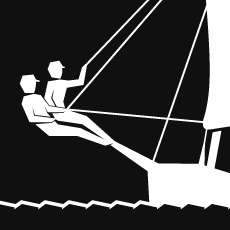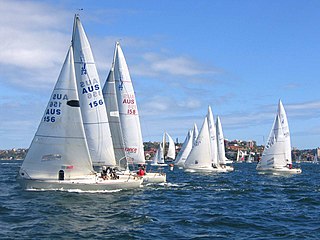Race Officers are a type of race official used during the running of sailing races run under the Racing Rules of Sailing. Their role is primarily linked to on-the-water race management issues. Primarily they are responsible for laying the course and starting and finishing the races. The International Sailing Federation helps train its member national authorities, many of whom have a national race officers program. The most experienced become International Race Officials recognised by the International Sailing Federation.

Sailing/Yachting made its first appearance as an Olympic sport at the 1900 Summer Olympics after competitions were cancelled at the 1896 Olympics. With the exception of 1904, sailing was thereafter always a part of the Olympic program. The sailing program in 1900 consisted of a total of eight sailing classes. For six classes, the races were scheduled from 20 – 27 May at the river Seine around Meulan, and a series of three races was held for the largest classes from 1–5 August on the North Atlantic off the coast of Le Havre. Approximately 150 sailors in 64 boats from 6 nations competed, including 1 woman, Hélène de Pourtalès, who won a gold medal in the 1 to 2 ton.

World Sailing (WS) is the world governing body for the sport of sailing recognized by the International Olympic Committee and the International Paralympic Committee (IPC).
Sailing/Yachting is an Olympic sport starting from the Games of the 1st Olympiad. With the exception of 1904 and possibly the cancelled 1916 Summer Olympics, sailing has always been included on the Olympic schedule. The Sailing program of 2008 consisted of a total of nine sailing classes. Eleven races are scheduled for each event except for the 49er class, for which 16 races are scheduled from 9 August 2008 to 21 August 2008 of the coast of the Qingdao International Sailing Centre facing the Yellow Sea. Of the 11 (16) races, 10 (15) are scheduled as opening races and one as a medal race. The sailing was done on four different types of courses.

The Korea Cycling Federation is the national governing body of cycle racing in South Korea. Its main road bicycle racing event is the Tour de Korea.
The Finn was a sailing event on the Sailing at the 2008 Summer Olympics program in Qingdao International Sailing Centre. Eleven races were scheduled. Only nine races were completed, including the medal race, due to lack of wind. 26 sailors, on 26 boats, from 26 nations competed. Ten boats qualified for the medal race.
The Mixed Tornado was a sailing event on the Sailing at the 2008 Summer Olympics program in Qingdao International Sailing Centre. Eleven races were scheduled and completed. 30 sailors, on 15 boats, from 15 nations competed. Ten boats qualified for the medal race.
The mixed 49er was a sailing event on the Sailing at the 2008 Summer Olympics program in Qingdao International Sailing Centre. Sixteen races were scheduled. Only thirteen races were completed including the medal race due to lack of wind. 38 sailors, on 19 boats, from 19 nations competed. Ten boats qualified for the medal race.
The men's Star was a sailing event on the Sailing at the 2008 Summer Olympics program in Qingdao International Sailing Centre. Eleven races were scheduled and completed. 32 sailors, on 16 boats, from 16 nations competed. Ten boats qualified for the medal race.
The Men's RS:X was a sailing event on the Sailing at the 2008 Summer Olympics program in Qingdao International Sailing Centre. Eleven races were scheduled and completed. 35 sailors, on 35 boards, from 35 nations competed. Ten boards qualified for the medal race.
The Laser was a sailing event on the Sailing at the 2008 Summer Olympics program in Qingdao International Sailing Centre. Eleven races were scheduled. Only ten races were completed including the medal race due to lack of wind. 43 sailors, on 43 boats, from 43 nations competed. Ten boats qualified for the medal race.
The Men's 470 was a sailing event on the Sailing at the 2008 Summer Olympics program in Qingdao International Sailing Centre, in the 470 dinghy. Eleven races were scheduled and completed. 58 sailors, on 29 boats, from 29 nations competed. Ten boats qualified for the medal race.
The Women's Yngling was a sailing event on the Sailing at the 2008 Summer Olympics program in Qingdao International Sailing Centre. Eleven races were scheduled. Only nine races were completed including the medal race due to lack of wind. 45 sailors, on 15 boats, from 15 nations competed. Ten boats qualified for the medal race.
The women's 470 was a sailing event on the Sailing at the 2008 Summer Olympics program in Qingdao International Sailing Centre. Eleven races were scheduled and completed. 38 sailors, on 19 boats, from 19 nations competed. Ten boats qualified for the medal race.
The Laser Radial was a sailing event on the Sailing at the 2008 Summer Olympics program in Qingdao International Sailing Centre. Eleven races were scheduled. Only ten races were completed including the medal race due to lack of wind. 28 sailors, on 28 boats, from 28 nations competed. Ten boats qualified for the medal race.
The Women's RS:X was a sailing event on the Sailing at the 2008 Summer Olympics program in Qingdao International Sailing Centre. Eleven races were scheduled and completed. 27 sailors, on 27 boards, from 27 nations competed. Ten boards qualified for the medal race.

Sailing at the 2012 Summer Olympics in London was held 29 July – 11 August 2012 at Weymouth and Portland National Sailing Academy in Weymouth. The 2012 sailing program consisted of a total of ten events. Eleven fleet races were scheduled off the coast at Weymouth Bay for each event, except for the 49er and the Elliott 6m classes. For the 49er class, a total of 16 races were scheduled. Of the 11 (16) races, 10 (15) were scheduled as opening races and the last one as medal race. For the Elliott 6m a series of match races was scheduled. The sailing was done on different types of courses.

The sport of sailing involves a variety of competitive sailing formats that are sanctioned through various sailing federations and yacht clubs. Racing disciplines include matches within a fleet of sailing craft, between a pair thereof or among teams. Additionally, there are specialized competitions that include setting speed records. Racing formats include both closed courses and point-to-point contests; they may be in sheltered waters, coast-wise or on the open ocean. Most competitions are held within defined classes or ratings that either entail one type of sailing craft to ensure a contest primarily of skill or rating the sailing craft to create classifications or handicaps.
Judges are a type of race official used during the running of sailing races run under the Racing Rules of Sailing. Their role is primarily linked to being on a protest committee which is a panel of judges. In sailing, unlike many sports, due to the practical considerations involved, umpiring (refereeing) is not very common. In the event of competitors not being able to resolve issues afloat, then a competitor or race committee may bring an issue in front of a protest committee for their consideration. The International Sailing Federation helps train its member national authorities many of whom have a national judges program. The most experienced become International Judges recognised by the International Sailing Federation.
Umpires are a type of race official used in the running of sailing races run under the Racing Rules of Sailing. Their role is primarily linked to making on the water decisions about rule infringements during match racing events or rule 42 calls during fleet racing. Most racing is run without umpires and unresolved issues are dealt with after the racing finished in front of a panel called the protest committee. The International Sailing Federation helps train its member national authorities many of whom have a national umpires program. The most experience become International Umpires recognised by the International Sailing Federation.

Dorian van Rijsselberghe is a sailor (windsurfer) from the Netherlands.